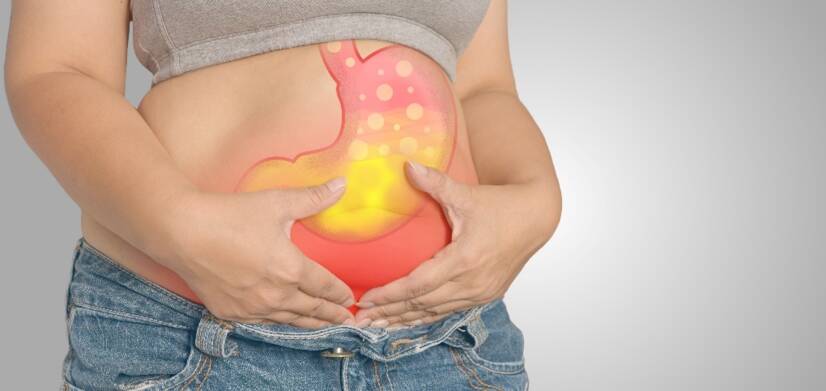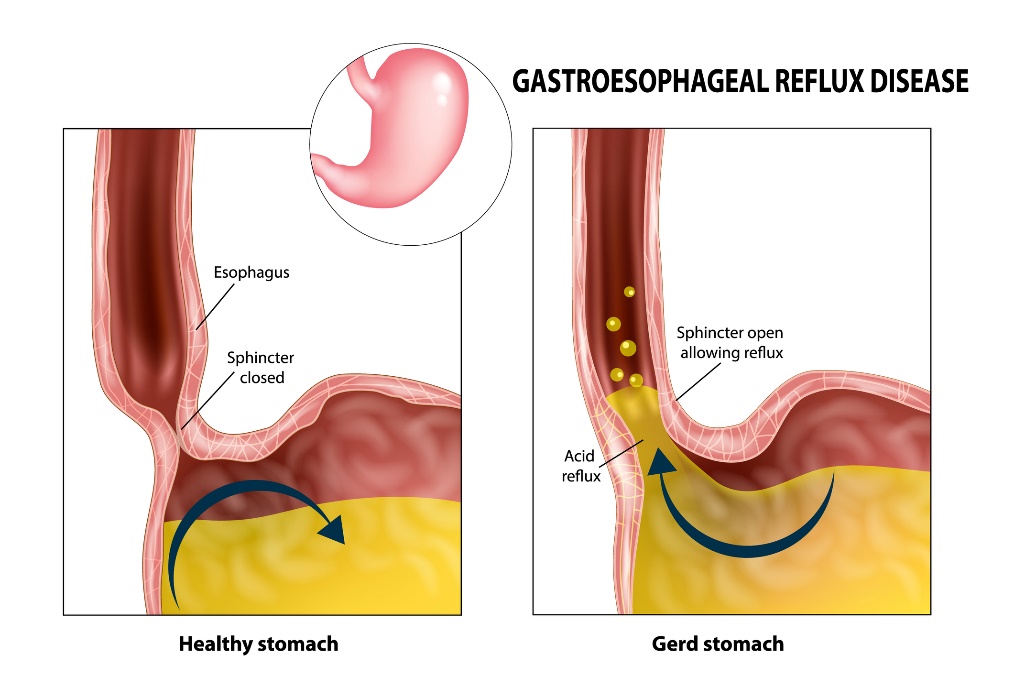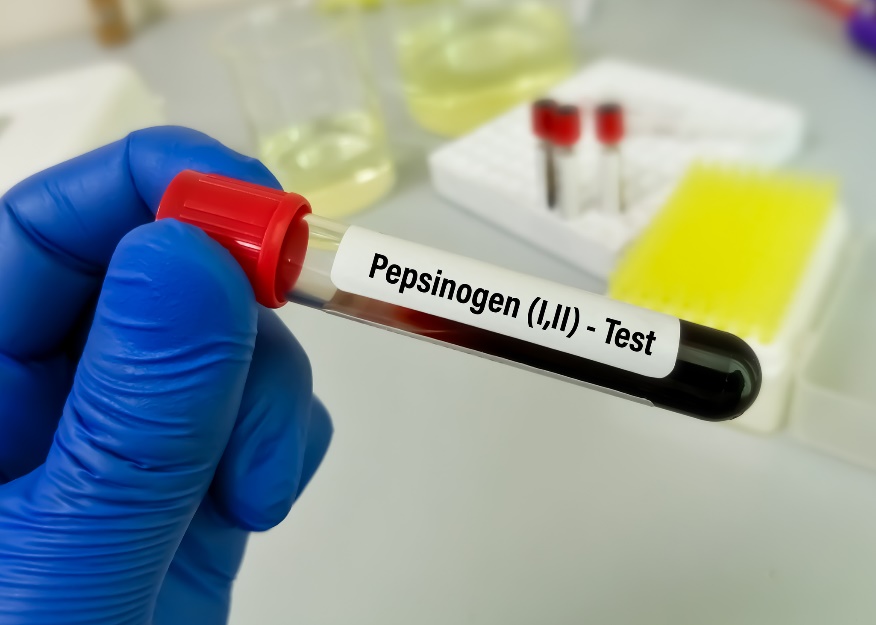- MARTÍNEK, Jan and Pavel TRUNEČKA. Gastroenterology and hepatology in algorithms. Prague: Maxdorf, [2021]. Jessenius. ISBN 978-80-7345-684-9
- praktickelekarenstvi.cz - Physiology and pathophysiology of the stomach. Solen. MUDr. Zdeněk Wilhelm, CSc., MUDr. Peter Hegyi
- solen.cz - Esophageal reflux disease. Solen. MUDr. Radek Kroupa
- healthline.com - All About pH for Stomach Acid. Healthline. Kimberly Holland
- medicalnewstoday.com - What is acid reflux? Medical News Today. Markus MacGill .
Hydrochloric acid in the stomach: function, low and high levels? How to keep it in the norm?

The contents of the stomach are made up of gastric juice, including stomach acid. Its function is important for the physiological digestion of food. However, a change in acidity levels can cause digestive problems. What are the symptoms of an altered stomach acid norm?
Article content
The function and content of gastric juice, symptoms of high and low acidity, diagnosis, home help and many other interesting information can be found in the article.
What is stomach acid?
Stomach juice is a watery, colorless liquid containing hydrochloric acid, abbreviated as HCL. Its main role is to create an acidic environment in the stomach. It helps to break down and digest ingested food and absorb nutrients into the body.
Last but not least, HCL activates digestive enzymes.
The gastric juice forms:
- Hydrochloric acid (activating digestive enzymes, creating an acidic environment and aiding digestion)
- The enzyme pepsin (promotes digestion and protein breakdown)
- Gastrin (a hormone that regulates digestive tract function)
- Mucin - mucus (protection of the mucosa from acid and the passage of food)
- Lipase enzyme (promotes digestion and fat breakdown)
Function and role of hydrochloric acid:
- Activation of digestive enzymes
- Conversion of pepsinogen to pepsin
- Digestion and breakdown of food
- Absorption of nutrients into the body (vitamins, minerals)
- Protection against pathogens from the diet
- Regulation of intestinal microflora
Hydrochloric acid is an irritating and highly acidic fluid, but it occurs physiologically in the stomach. A change in pH to a higher or lower acidity level can cause unpleasant health problems.
The walls of the gastric mucosa are protected from the corrosive effect of hydrochloric acid by neutralising mucus - mucin.
However, if the acid gets from the stomach into the oesophagus and higher levels of the digestive tract, which are not protected from its strong effect, an unpleasant burning sensation(heartburn) or pain occurs.
The level and pH of gastric juice
The level of gastric juice is approximately 1.5 to 3.5. This is a highly acidic pH environment.
Hydrochloric acid is secreted by parietal cells located in the wall of the stomach. The pH level of this secretion is approximately 0.9. However, when this secretion is mixed with other components of mucin, saliva and food, the pH of the stomach increases to 1.5 to 3.5.
The production of gastric juice is approximately 2 to 3 litres per day.
Low levels of stomach acid
Low stomach acid is characterised by heartburn. If there is little hydrochloric acid in the stomach, the sphincter does not close and the stomach contents subsequently return to the oesophagus.
It is also manifested by excessive bloating, a feeling of fullness and tiredness after eating, problems with defecation (diarrhoea/constipation), frequent belching or painful abdominal cramps.
Low stomach acid is a trigger for poor digestion. Ingested foods and nutrients are not properly broken down, causing bad bacteria and digestive problems.
Symptoms and manifestations of HCl deficiency:
- Abdominal pain and cramps
- Heartburn
- Flatulence
- Burping
- Constipation/diarrhea
- Bloating
- Fullness and fatigue after eating
- Bad breath
- Nutrient deficiencies (anemia, weight loss, poor hair and nail quality)
Why do low HCL levels occur?
A common cause of low HCL levels in the stomach is just an inappropriate lifestyle - an unhealthy diet with excess sugars, pesticides and preservatives. Poorly modified diet, low zinc or fast food and excessive biting of food in a hurry.
Excessive exposure to stress, lack of regular, quality sleep and minimal physical activity. Chronic emotional stress reduces stomach acid production. This suppresses the parasympathetic nervous system, which is important for physiological digestion.
Hypochlorhydria is the term for low levels of hydrochloric acid in the stomach.
Low stomach acid is often associated with other diseases or disorders of the digestive tract (irritable stomach, reflux, infections, inflammatory diseases, food allergies and intolerances...).
Causes and risk factors of low gastric HCl levels:
- Older age
- Excessive exposure to stress
- Diseases of the digestive system
- Helicobacter pylori infection
- Diabetes mellitus
- Irritable bowel/stomach syndrome
- Reflux of gastric juices
- Conditions following surgery on and around the stomach
- Insufficient nutrient intake (especially zinc)
- Excessive sugar intake
- Food allergies and intolerances
- Pharmacotherapy with antacids

High levels of stomach acid
If the acid level in the gastric juice is too high, the protective mucus mucosa may be ineffective. Violation of the protection of the gastric mucosa by HCl can lead to many health problems.
High gastric acid production is also manifested by heartburn, which may be accompanied by reflux of gastric contents into the oesophagus and higher stages of the digestive tract.
There is an increased risk of gastric ulcers or gastroesophageal reflux due to high HCl levels.
Hyperchlorhydria is the term for high levels of hydrochloric acid in the stomach.
Symptoms and manifestations of high HCl levels in the stomach:
- Pain and pressure in the abdomen
- Sour/bitter taste in the mouth
- Heartburn
- Nausea
- Flatulence
- Feeling sick and vomiting
- Decreased appetite
- Disturbances in bowel movements (diarrhoea)
Causes and risk factors for high HCl levels in the stomach:
- Helicobacter pylori infection
- Imbalance of the hormone gastrin
- Excessive alcohol and coffee consumption
- Smoking
- Unhealthy diet and inappropriate lifestyle
Diagnosis of stomach acid levels
Diagnosis initially consists of taking a medical history, interview and assessment of clinical symptoms by the attending physician (general practitioner, gastroenterologist).
Diagnosis may be based on measurement of pepsinogen levels from a sample of the patient's blood serum.
Another method is to test for the presence of pepsin in the patient's saliva.
Pepsin is physiologically found in the stomach. If it is also found outside the stomach (throat and sinus area), there may be a medical problem associated with reflux.
Gastric acidity can be investigated by stimulating the parietal cells of the stomach (histamine, insulin, gastrin...). After the gastric probe and gastric juice collection, the laboratory determination of free and total HCl levels in the gastric environment follows.
The Heidelberger test consists of oral ingestion of a special electronic capsule the size of a normal vitamin. The aim of the test is to monitor the pH in the gastrointestinal tract and the function of the parietal cells to produce hydrochloric acid.
The capsule is passed through the digestive tract and the acidity in the stomach is monitored. The patient drinks water containing baking soda, which neutralises the acidity in the stomach.
If the acidity in the stomach is not restored within a specified time, the patient has a deficiency of HCl in the stomach.
The test takes approximately 1 to 2 hours. The acidity information is transmitted to a monitor where it is evaluated by the attending physician.

Treatment and prevention of gastric acid balance
The therapeutic approach depends on the patient's clinical symptoms and on determining the exact cause of the change in gastric acid levels.
Diagnosis is the key to successful treatment.
It is possible that despite the feeling of an overacidified stomach, the hydrochloric acid level is low. Therefore, a specialist diagnosis by a physician is necessary.
If the cause of the change in the level of gastric juice is an infectious disease (eg, Helicobacter pylori), the basis of treatment is the removal of the pathological organism with antibiotics or antiviral drugs.
In chronic inflammatory diseases of the digestive system, the method of long-term treatment and the elimination of clinical symptoms should be consulted with a doctor.
In most cases, doctors prescribe antacids for heartburn.
Pharmacotherapy containing HCl in the form of betaine is often indicated to increase the production of gastric acid.
However, the doses of betaine are individual for each individual. There should be a gradual reduction in doses. If there is no subsequent worsening of digestion after discontinuation, the stomach is probably sufficiently stimulated to produce HCl on its own.
However, HCL tablets are not recommended when taking other drugs that disrupt the stomach wall. Care should be taken to avoid stomach acidification and gastric ulceration. Consultation with a physician is necessary.
Probiotics are beneficial bacteria that support the intestinal flora and the digestive process. These good bacteria help by breaking down indigestible fibers that cause gas or bloating.
A change in lifestyle and diet is also part of the treatment. A sufficient intake of vegetables (lettuce, spinach, broccoli, cabbage...) is recommended. HCl formation is particularly supported by the intake of e.g. sodium, zinc, vitamins B1, B3 and B6.
A home recipe is apple cider vinegar and ginger, which has a beneficial effect on the formation of stomach acid, eliminating reflux and heartburn.
Apple cider vinegar is a fermented liquid made up of crushed apples, good bacteria and yeast. It is rich in protein and enzymes that help break down bacteria, thus promoting an increase in stomach acid levels.
Ginger is known for its anti-inflammatory properties and its positive effect on the treatment of reflux and other gastrointestinal disorders. Ginger can be chopped or grated for eating and drinking (tea). It can also be consumed as a dietary supplement.
As a preventive measure and a change in diet is recommended:
- Slow eating with proper food processing in the oral cavity
- A full regular diet (protein, carbohydrates, fats and fibre)
- Adequate drinking (plain water, mineral water, tea)
- Limit intake of highly processed foods
- Limit alcohol consumption and smoking
- Limit excessive intake of sugars
- Adequate intake of vitamins and minerals (zinc, vitamin B)
- Adequate intake of (fermented) vegetables and fruit
- Natural help with apple cider vinegar, ginger or lemon
Interesting resources










